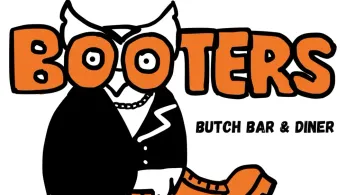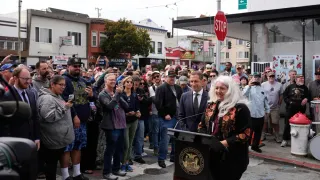
2 hours ago
Booters: New Jersey’s Groundbreaking Lesbian Diner Creates Belonging for Butches, Studs, and Queers
READ TIME: 3 MIN.
Booters, a pop-up lesbian diner recently launched in New Jersey, is quickly making waves for its unapologetic celebration of lesbian, queer, and especially butch and masc identities. Unlike the traditional diner experience, Booters is designed as a joyful, inclusive space where butches, studs, bois, and mascs—along with those who love and admire them—are not just welcome, but centered and celebrated. The project’s playful name nods to the mainstream chain Hooters, but Booters subverts that model, prioritizing community, diversity, and LGBTQ+ history over commercialization and objectification .
Booters made its debut through a series of pop-up events in New York and New Jersey, including highly anticipated tryout parties at iconic queer venues such as Gingers and Cubbyhole. Each event merges classic diner kitsch with campy competitions, inviting participants to showcase their “grit, charm, and service”—with one memorable round revolving around how many mouths could be filled with whipped cream before the timer ran out .
The events themselves are as much about fun as they are about building community. The scene at Gingers, for example, was described as “sweaty dykes wall-to-wall, all hoping to catch a glimpse of the chosen Booters candidates,” with queer people from across the gender spectrum coming together in a spirit of camaraderie and celebration .
What sets Booters apart is not only its atmosphere but its explicit commitment to representing the diversity within butch and masc identities. According to co-founder Oran, “The most important thing for us is showing that there’s no one way to be a ‘hot butch.’” Booters’ tryouts and events have featured a wide range of contestants, reflecting the rich, intersectional, and trans-inclusive history of butch identity—a legacy informed by figures like Leslie Feinberg, Amy Fox, and Cheryl Dunye, who have all contributed to expanding understandings of gender and queerness within the lesbian and broader LGBTQ+ community .
This focus on diversity and history is especially significant given the ongoing decline of lesbian bars and spaces across the United States. According to historians and activists, lesbian bars have played a crucial role in queer history, providing rare sanctuaries for community-building, identity exploration, and resistance to mainstream norms . Booters’ commitment to honoring and continuing that tradition is clearly resonating with attendees, who describe the events as both affirming and empowering.
The emergence of Booters comes at a critical time, as the number of lesbian bars in the U.S. has dwindled over the past decades. This decline has left many queer women, nonbinary people, and gender-nonconforming individuals without dedicated, affirming spaces where they can safely gather. Community historians emphasize that the loss of these bars represents not just the disappearance of nightlife venues, but the erosion of vital hubs for organizing, mutual support, and cultural expression .
Booters’ founders are outspoken about their mission to counteract this trend by offering a fresh model—one that combines the conviviality and accessibility of a diner with the radical inclusivity and political consciousness of queer spaces past and present. Their events are open to all who affirm and respect the identities and histories being honored, with a particular emphasis on uplifting those whose experiences are often marginalized even within the LGBTQ+ community .
As Booters continues to expand its reach, the team behind the diner is already planning additional events and collaborations, with the aim of establishing a more permanent presence in New Jersey and beyond. Their vision is to create not just a recurring event, but a lasting institution—one that can serve as a model for other queer entrepreneurs seeking to build spaces that are both fun and affirming, rooted in history yet open to new possibilities.
The enthusiastic response from the community suggests that Booters is tapping into a deep and ongoing need. As one attendee put it, “This is the dyke diner of my dreams. It’s a place where I can be myself, surrounded by people who get it—who get me.” .
By centering experiences often pushed to the margins, Booters is doing more than serving food and fun—it is nourishing a movement, helping to ensure that the next generation of queer and lesbian people have spaces to call their own.






